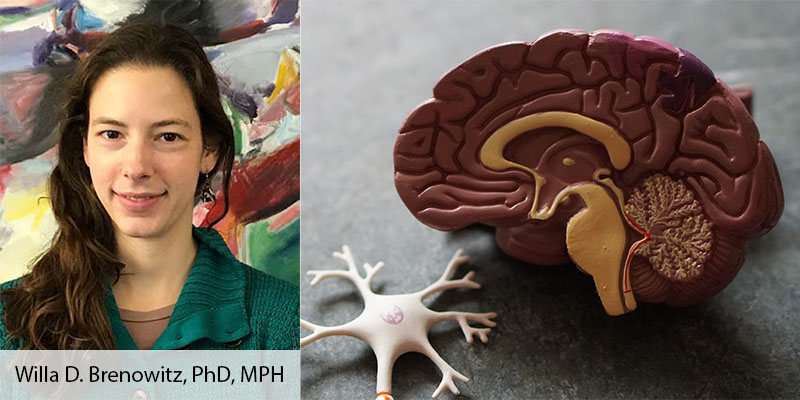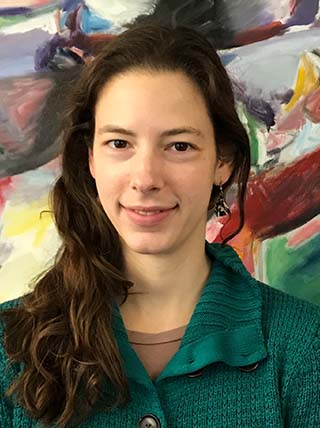
By Katie Essick, CHR Writer and Editor
 Willa Brenowitz, PhD, MPH
Willa Brenowitz, PhD, MPH
As we age, our likelihood of developing dementia goes up, while the ability of our classical senses — hearing, vision, touch, taste, and smell — goes down. Willa Brenowitz, PhD, MPH, who joined the Kaiser Permanente Center for Health Research (CHR) as an Investigator in February 2023, is focused on teasing out the potential connections between the two.
Her goal: identifying modifiable risks to stem the onset and progress of Alzheimer’s disease. A modifiable risk is a risk we can do something about—something we can act on.
According to the Alzheimer’s Association, brain changes caused by Alzheimer’s disease are the most common contributor to dementia. Estimates are that 6.7 million Americans have Alzheimer’s, and as the U.S. population of individuals aged 65 and older grows — from 58 million in 2021 to 88 million by 2050 — so will the number of people with Alzheimer’s and other forms of dementia.
Alzheimer’s was identified more than a century ago, but research on and treatment of the disease has soared in recent decades. Recently, the FDA fully approved the first drug to slow the progression of the disease, although its effectiveness remains highly controversial.
Brenowitz has carved out her own niche.
“I tend to be drawn to understudied diseases, so within the context of Alzheimer’s, I’m focusing on sensory impairments,” she said. “Hearing and vision loss, for example, are very common and affect almost everyone, but research in those areas has traditionally been less common.”
She is intrigued by how sensory elements work both independently and together; how “some people have multiple impairments, and others have just one.” She points to research finding that two-thirds of older adults have sensory loss in multiple domains, while since the COVID-19 pandemic, there has been increased interest in the loss of smell in relation to health outcomes.
“My hypothesis is that there are multiple pathways between sensory loss and dementia,” Brenowitz says.
The path to sensory research
Raised in Seattle, Brenowitz can trace her career path as far back as seventh grade, when her science class studied the human brain for the full school year. By high school, she says, “I knew I wanted to study neuroscience.” The seeds might have been planted even earlier, though, as she has family members in both medicine and neurobiology.
Brenowitz received her bachelor’s degree in biology and society from Cornell University; that was followed by a stint in the Peace Corps in Armenia, centered on environmental education among youth. Upon her return to Seattle, she enrolled at the University of Washington. There, she earned a Master of Public Health degree in health services and a PhD in epidemiology.
At UW she worked at the National Alzheimer’s Coordinating Center, where she conducted research on brain pathologies (diseases) found at autopsy among older adults; many people with dementia are found to have had more than one brain disease. That was followed by post-doctoral studies at the University of California, San Francisco (UCSF).
Before joining CHR earlier this year, Brenowitz was an assistant professor in UCSF’s Department of Psychiatry and Behavioral Sciences and the Department of Epidemiology & Biostatistics, where she remains an affiliate.
Through a study funded by the Alzheimer’s Association, she found that a greater number of sensory impairments along with lower functioning were associated with a higher risk of dementia. Currently, she is conducting research on the relationship between hearing and vision loss and dementia with a career development award from the National Institute on Aging.
Looking forward
Brenowitz’s research on the association between sensory impairment and Alzheimer’s disease is complemented by her work in related areas, including examining risk factors such as depression, and identifying the earliest signs of the disease. She’s also interested broadly in topics related to aging and Alzheimer’s disease, including understanding the interplay of genes, environment, and the impact of other health conditions on aging and cognitive decline.
Much of her research involves the use of data collected in large studies that follow people over time. While she continues this work, she hopes to add more datasets from Kaiser Permanente, conduct research with patient participants, and partner with other CHR investigators.
“What drew me to CHR were my interactions with the people here,” she says. “The Center has a lot of expertise at all levels. And I like being in a smaller setting among people who’ve been here for a while. I’m excited to be here.”